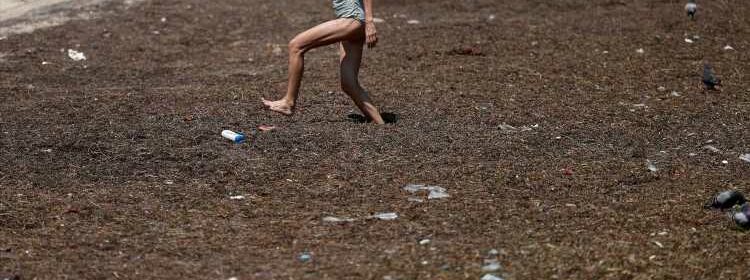Urgent holiday warning as ‘toxic seaweed covered in flesh-eating bacteria’ washing onto beaches in top tourist hotspot | The Sun

HOLIDAYMAKERS have been warned to be wary as toxic seaweed feared to be covered in flesh-eating bacteria washes up on beaches.
The thick brown algae – known as Sargassum – has been blanketing shorelines in South Florida and scientists believe it is infested with hazardous pathogens.
Sargassum is the ideal host for Vibrio bacteria, which lives in certain coastal areas and thrives in brackish water, to invade.
As the infected seaweed latches on to plastic debris, experts say it creates a "pathogen storm" that can pose a risk to beachgoers.
And there is reportedly a 5,000-mile wide clump of Sargassum, dubbed the "Great Atlantic Sargassum Belt", floating towards Florida.
Tourists could be struck down by a condition called "leaky gut syndrome" if they come into contact with Vibrio bacteria.
READ MORE ON FLORIDA
Woman left looking like she’s been grilling on BBQ after a tanning disaster
Alligator bites off man’s arm in horrifying attack behind bar
Those infected may suffer a range of symptoms including diarrhea, stomach cramps, vomiting, fever, chills, ear infections and wound infections.
A study from Florida Atlantic University published in the Water Research journal revealed that Sargassum seaweed which has washed up on beaches is home to high levels of the bacteria.
Huge masses of it have engulfed shores in recent weeks, forcing swimmers to trundle through it barefoot.
Researchers found the Vibrio bacteria has a unique makeup of "zot" genes, which produce toxins that can damage the intestines.
Most read in The Sun

Girl, 12, & boy killed on beach did NOT jump off pier & weren't hit by jet skis

Phillip Schofield's Soap Awards host replacement revealed as huge TV star

Loose Women star Kerry Katona breaks silence on Phillip Schofield after affair

Harry and Meghan to stop making royal-bashing shows & books after backlash
This leaves sufferers with a condition similar to "leaky gut syndrome" which allows harmful bacteria to leak through the gut and into the bloodstream.
Dr Tracy Mincer, an assistant professor of biology who led the study, said fish are unknowingly aiding the spike in Sargassum.
She explained: "If a fish consumes a piece of plastic contaminated with Vibrio bacteria, it can develop a leaky gut and release waste nutrients that stimulate the growth of Sargassum and other organisms in the surrounding environment.
"Our lab work showed that these Vibrio are extremely aggressive and can seek out and stick to plastic within minutes.
"We also found that there are attachment factors that microbes use to stick to plastics, and it is the same kind of mechanism that pathogens use."
Humans are typically affected by Vibrio bacteria when eating raw or undercooked seafood – particularly oysters – or through an open wound.
But some more menacing strains of the pathogen can cause life-threatening illnesses such as necrotising fasciitis, a flesh-eating bacteria infection that can lead to amputations or death.
The seaweed is also proving an eyesore and a trip hazard on beaches – while also emitting a vile smell as it decays under the hot sun.
Dr. Maxcie Sikora of AllerVie Health explained it gives off hydrogen sulfide when it rots, which irritates the airways.
She told the Daily Mail: "Coughing, wheezing, shortness of breath–it makes for an unpleasant experience for asthmatics.
"If you plan on heading to the Florida coast this summer, people with respiratory problems like asthma, COPD, or other illnesses I haven't mentioned need to take care.
"For those who come in contact with or spend time near Sargassum, I advise taking an over-the-counter antihistamine such as Benadryl or Diphenhydramine."
Florida was flooded with an increase of Vibrio cases last year in the wake of Hurricane Ian, as the bacteria flourished in warm standing water.
While warning that the research found some Vibrio strains target both plants and animals, experts warned tourists to steer clear of it over the summer.
Mincer added: "I don't think at this point, anyone has really considered these microbes and their capability to cause infections.
"We really want to make the public aware of these associated risks.
"In particular, caution should be exercised regarding the harvest and processing of Sargassum biomass until the risks are explored more thoroughly."
Most people do not become unwell after brief exposure, but those with respiratory issues are even more susceptible to sickness.
Read More on The Sun
My neighbour built a 6ft fence blocking my view… I was told to make a change
Shoppers rush to buy ‘life-saver’ device that relieves period pains INSTANTLY
Many have pointed out the risks hotel and resort workers face when spending hours cleaning up Sargassum from the sand.
Five people were infected with Vibrio bacteria in Connecticut in September 2020.
Source: Read Full Article









